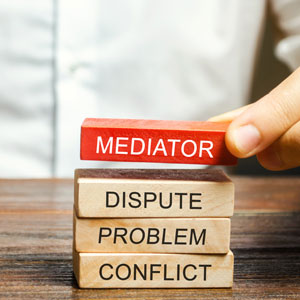
In this article, you can discover…
- How mediation can help resolve contract disputes.
- Factors to consider when deciding between mediation and litigation.
- How mediation compares to a trial in terms of speed.
What Is The Mediation Process For Contract Disputes Like?
When a contract dispute arises, mediation offers a faster, less costly, and more flexible resolution compared to litigation. Instead of leaving the outcome to a judge, mediation allows both parties to negotiate a solution with the help of a neutral third party. With a focus on communication and compromise, mediation is particularly effective for contract disputes—where the core issue is often interpretation and expectation rather than outright wrongdoing.
Here’s an overview of how the process works:
- Initial Agreement To Mediate: Both parties agree to resolve the dispute through mediation rather than court.
- Choosing A Mediator: A neutral mediator—often a retired judge or experienced attorney—is selected.
- Pre-Mediation Preparation: Each party submits relevant documents and a summary of their position.
- Mediation Session(s): The mediator facilitates discussions, clarifies misunderstandings, and proposes solutions.
- Settlement Or Impasse: If an agreement is reached, it’s put in writing and becomes enforceable. If not, the parties typically pursue litigation.
Mediation is typically resolved in weeks or months. In fact, it is not uncommon for it to be resolved within a single day. On the other hand, litigation can take months or years due to court schedules and procedural delays.
What Does The Timeline Look Like If I Use Mediation As Opposed To Litigation When Resolving A Contract Dispute?
The timeline for resolving a contract dispute through mediation depends on whether the contract mandates mediation before litigation and the specific statute of limitations governing the dispute. In industries like real estate and construction, contracts often require mediation before litigation—sometimes within six months of discovering the issue. Failing to mediate first could mean breaching the contract itself.
In many instances, mediation is the preferred first step and lends itself to a faster, more cost-effective resolution. The timeline is subject to several conditions but generally takes a few weeks to a few months from the start of mediation.
If mediation fails—or is not required—the dispute moves to litigation. In the pre-trial phase, one side will formally file the lawsuit. From there, both sides exchange evidence and begin depositions. Depositions alone can take months to over a year.
After this, both sides juggle court schedules, motions, and trial proceedings that add significant time as part of the overall litigation process. Appeals, if applicable, can extend the process by several years. Generally, the process takes one to three years, depending on complexity.
What Are The Benefits Of Mediation Over Litigation In Contract Disputes?
Mediation offers flexibility and creative solutions that litigation simply cannot. In court, a judge has limited options—either ruling that a breach occurred and awarding damages or deciding there was no breach at all. Mediation, however, allows parties to craft solutions that meet their needs more effectively.
For example, a business dispute could be resolved with a structured payment plan, contract renegotiation, or even an apology—something a court would never order. Mediation also considers real-world factors like mitigating damages and future business relationships, making it a more practical and often less adversarial process.
On top of this, the parties involved have far more control over the timeline and terms of the agreement rather than being subject to a rigid court ruling. This flexibility makes mediation a valuable tool for resolving contract disputes efficiently and fairly.
What Factors Should I Consider When Choosing Between Mediation Or Litigation For My Contract Dispute In California?
Mediation is often faster, more affordable, and flexible, making it the best way to settle business disputes for many and the preferred first step in most contract disputes. However, if negotiations break down, litigation remains an option. When deciding between mediation and litigation, consider these key factors:
- Time Commitment: Litigation can take 1 to 3 years or more, depending on court backlog and complexity. Mediation can be scheduled within weeks or months, offering a faster resolution.
- Cost: Litigation is fairly expensive, given the attorney fees, court costs, and discovery expenses. Mediation is typically much cheaper since it requires fewer billable hours and avoids drawn-out legal battles.
- Level Of Control: A judge or jury makes the final decision in litigation, often leading to unpredictable outcomes. On the other hand, you retain more control over the mediation process and can negotiate terms that work for both parties.
- Nature Of The Dispute: Mediation is ideal when both parties are willing to negotiate and want a mutually beneficial solution. Litigation may be necessary if one party refuses to cooperate or if there’s a major legal question that needs a formal ruling.
- Confidentiality: Court proceedings and case details in litigation are typically public record. Conversely, mediation is completely private, which is important if you want to avoid reputational risks.
- Relationships Going Forward: Litigation lends itself to creating hostility and permanent rifts between parties. Mediation can allow for a more amicable resolution, which is important if you wish to continue working together with the other party after the dispute is resolved.
A More Effective Solution Than Litigation
Mediation has worked in so many cases throughout my career because it allowed both parties to see the dispute from a neutral perspective rather than just their own. In one such instance, a buyer felt misled, but when presented with clear evidence — visible golf ball marks and protective netting—they had to acknowledge that the issue might not have been deliberately concealed. The third-party mediator’s impartial questioning helped highlight these facts in a way that neither side had fully considered.
Had this gone to litigation, the case might have dragged on for months or years, costing both sides heavily in legal fees. Instead, mediation brought clarity quickly and allowed for a practical resolution, saving both parties significant amounts of time, money, and stress.
Still Have Questions? Ready To Get Started?
For more information on Best way to settle business disputes, an initial consultation is your next best step. Get the information and legal answers you are seeking by calling (916) 777-0943 today.
